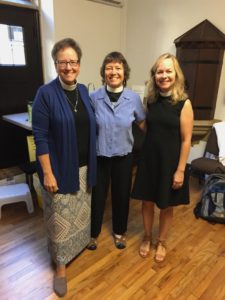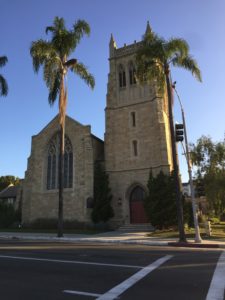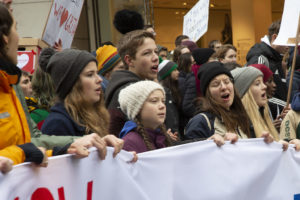Our planet keeps setting records for heat. This week – at long last – a different record was set: the biggest day of climate protest in world history.
On September 20, 2019, more than 4 million people around the world went on strike to demand bold action to stop the climate crisis. Global Climate Strikes, inspired by Swedish teenager Greta Thunberg, were carried out in more than 150 countries, from Australia and the Pacific Islands to India, Turkey, Europe, and across the United States. Countless people of faith, including Episcopalians, took part, and I am thrilled to say that Episcopal bishops, led by Presiding Bishop Michael Curry, walked out of their House of Bishops meeting in Minneapolis to join the climate strike and issue a statement of support.
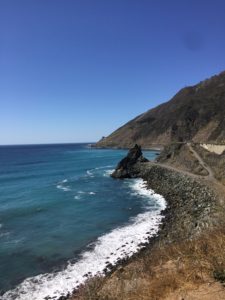
On September 19, the day before the Global Climate Strike, I returned home from an intensive mission trip along the coast of California, where I preached, led retreats and workshops, and spoke in multiple cities about the climate crisis. It was the first time I’d met people who had so recently and directly experienced the disastrous effects of climate change, from massive heat waves, droughts and wildfires to torrential rainfall and mudslides. I didn’t need to say very much about the urgency of the situation – I could tell from the alarming stories they shared and the concern in their faces that they already understood: we need as a species to change course fast. From Santa Barbara to Cupertino I urged everyone I met to join the weeklong Global Climate Strike.
Back in western Massachusetts on September 20, I spoke at two Climate Strike events in my corner of the world, Springfield and Northampton. Below are the notes for my remarks.
————————
Springfield Climate Vigil: Standing for life
Under a hot sun, sixty or seventy people gathered at Court Square, Springfield, MA, for a climate solidarity vigil filled with music, speaking, and prayer. Organized by Verne McArthur, the vigil featured speakers including Buddhist teacher Jin Haeng Kyle Wiswall, Springfield City Councilor-at-Large Jesse Lederman, Deacon Bill Toller (who read a statement by U.S. Roman Catholic bishops on the need for climate action), Rev. Jason Seymour (Unitarian Universalist Society of Greater Springfield), Sister Melinda Pellerin-Duck (Sisters of St. Joseph of Springfield), and me. Rev. Marisa Brown Ludwig joined Verne in leading the singing. Here is what I said:
I am grateful to be standing with you! In my tradition there is a story of God’s people standing at a crossroads. They have a choice to make, and Moses says to them: “Today I have set before you life and death, blessings and curses. Choose life so that you and your descendants may live.”
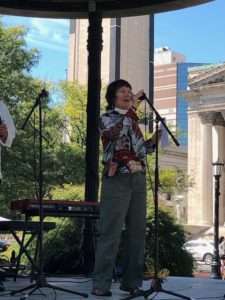
We, too, stand at a crossroads. We are living at a pivotal moment in human history, where the choices we make going forward will make all the difference to the wellbeing of our children and our children’s children, and to the life – or death – of billions of people and non-human species around the world.
We know we have a choice. Today, at this crossroads, we stand for life.
You know that we face a long struggle ahead. The U.N. Intergovernmental Panel on Climate Change has told us that we need to transform our society at a rate and scale that are historically unprecedented. This task will demand all our reserves of strength and courage. We need spiritual resilience. So it’s good to know where we are rooted and where we find strength.
Where does our strength come from? We begin by knowing where we stand.
We stand on Mother Earth. I invite you to feel your feet on the ground and to feel the good Earth holding you up. We can imagine our roots going down deep into the Earth, and from deep within Mother Earth we are drawing up strength.
We also stand with trees and all green-growing things.
We stand with other creatures – our brother-sister beings;
with children and young people who long to inherit a habitable planet; and
with the marginalized and poor, the people most vulnerable to climate change.
We stand with everyone who is suffering right now from floods, droughts, and storms,
and with the millions of people worldwide who are rising up to say that they won’t settle
for a death-dealing way of life.
We stand for a better future.
We stand for the possibility that love, not hate, will have the last word.
We stand for the possibility that our species will learn wisdom and compassion, generosity and self-control, so that we become at last what we were made to be: a blessing on the Earth.
And we stand in something, too. What do we stand in?
We stand in love.
We stand in the divine love that is always being poured into our hearts,
in the love that will never let us go and that will be with us till our journey’s end.
We stand in the love that nothing, not even death, can destroy.
We stand in the love whose power, working through us, can do infinitely more than we can ask or imagine.
You and I – we stand for life. Thank you!
————————
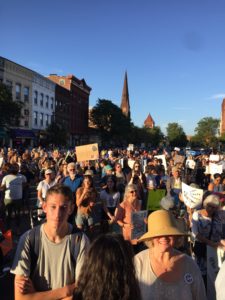
Climate Emergency March for a Just Future, Northampton: A blessing
Late in the afternoon, many hundreds of people marched from Sheldon Field to downtown Northampton for a rally at City Hall. Organized by Marty Nathan (Climate Action NOW of Western Massachusetts), the rally featured music (led by Peter Blood and Paul Kaplan, and by Expandable Brass Band) and a range of speakers, including State Senator Jo Comerford, City Council President Ryan O’Donnell, Barb Madeloni (Labor Notes and past President, Massachusetts Teachers Association), Victor Davila (Neighbor to Neighbor Springfield), Maeve McCurdy (Divest Smith), State. Rep. Lindsay Sabadosa, Patrick Burke (SEIU and Hampshire Labor Council), Andrea Schmid (Pioneer Valley Workers Center), and Kate Parrott (teacher at JFK Middle School).
Rabbi David Seidenberg (Prayerground Minyan) and I offered closing blessings. After each of us had prayed, the Rabbi blew his shofar to complete the rally. My blessing, more or less as delivered, is below.
Friends, we have good work to do and we face great challenges ahead. We need to root ourselves in our deep sources of wisdom, strength, and courage. This is a good time to turn to a power greater than ourselves, one that we know by many names: Great Spirit, loving Mystery, Creator and Sustainer of life. Dante called it “the love that moves the sun and the other stars.” Trusting in that sacred power, we can do infinitely more than we can ask or imagine.
I’d like to offer a blessing that I adapted from a Franciscan prayer1 that may be familiar to some of you. I invite you to join me in a spirit of prayer.
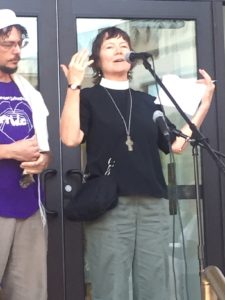
May God bless us with discomfort
At easy answers, half-truths, and superficial relationships,
So that we may live deep within our heart.
May God bless us with anger
At injustice, oppression, and exploitation of people and the Earth,
So that we may work for justice, freedom, and peace, and pass along to the next generation a habitable world.
May God bless us with tears
To shed for people and all our brother-sister beings who suffer from the effects of climate change,
So that we may reach out our hands to comfort them
And turn their pain into joy, and our grief into action.
And may God bless us with enough foolishness
To believe that we can make a difference in the world,
So that we can do what others claim cannot be done
To bring justice and kindness to children, to the poor, and to the whole of God’s Creation.
Amen.
1. The source of this prayer is unclear. One Website attributes it to Craig Groeschel: https://www.goodreads.com/quotes/280711-may-god-bless-you-with-discomfort-at-easy-answers-half
The original version reads:
May God bless you with discomfort
At easy answers, half-truths, and superficial relationships,
So that you may live deep within your heart.
May God bless you with anger
At injustice, oppression and exploitation of people,
So that you may work for justice, freedom and peace.
May God bless you with tears
To shed for those who suffer pain, rejection, hunger, and war,
So that you may reach out your hand to comfort them
And turn their pain into joy.
And may God bless you with enough foolishness
To believe that you can make a difference in the world,
So that you can do what others claim cannot be done
To bring justice and kindness to all our children and the poor.
